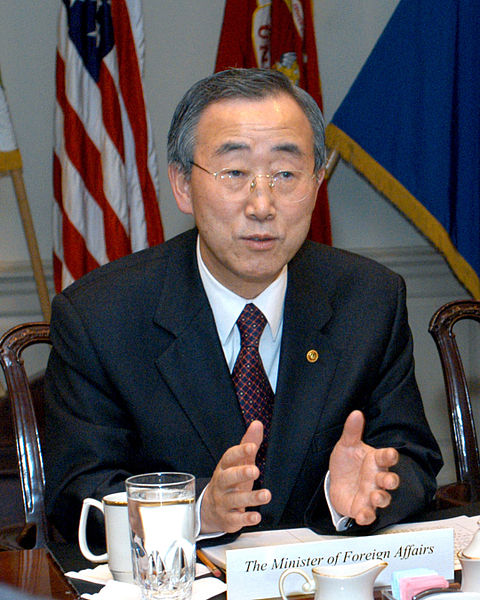
Current UN Secretary-General Ban Ki-moon; Photo Courtesy Wikimedia
Today an excellent story appeared in The New York Times about the attempts of United Nations Secretary-General Ban Ki-moon to undermine the new UN justice system.
According to the article, “independent judges appointed to revamp the way the United Nations reviews decisions on matters like hiring, firing, promotions and raises are accusing Secretary General Ban Ki-moon of shielding an unhealthy culture of secrecy and trying to undermine the new system.”
Previous Whistleblogger entries have documented the showdown between these judges and the Secretary-General, who has ignored several Tribunal orders to produce documents or have officials testify, thereby jeopardizing the rule of law at the United Nations.
According to The New York Times:
Diplomats, lawyers and others tracking the cases describe the United Nations’ stance on the tribunal as contradictory, if not hypocritical, given the organization’s role in promoting the rule of law globally. ‘The organization has to decide from the S.G. on down whether this is an organization that respects the rule of law or not,’ said George Irving, a former president of the staff union and a lawyer who has worked on administrative cases at the United Nations for more than 30 years. ‘What you are witnessing essentially is a power struggle. It is all about control, who is going to control the system’…
‘You have to look at the culture here,’ Judge Michael F. Adams, an Australian judge, said at the end of his stint on the dispute panel in New York. ‘Someone in the position of under secretary general is never confronted with the requirement that particular questions be answered.’
The NYT article also states that:
“part of the problem stems from the rigid hierarchy of the United Nations, lawyers and other experts say. The judges were assigned an administrative rank that puts them below an assistant secretary general, so those who rank higher often feel that answering the tribunal is beneath them, they said.”
The chronology of decisions taken in the establishment of the new justice system show that, in fact, it was the Secretary-General himself who was responsible for placing these judges in an inferior position and thus complicating their efforts to enforce the rule of law at the UN. In 2008, GAP and the UN Staff Union urged Ban Ki-moon to appoint these judges at the assistant secretary general level, to no avail.
To date, the Secretary-General has only ignored orders made by the United Nations Dispute Tribunal (UNDT), the first instance of the two-tier justice system. Cases will begin to be reviewed on Monday by the higher tier, the United Nations Appeals Tribunal (UNAT), so it remains to be seen whether or not the Secretary-General will comply with the directives issued by the Appeals Tribunal. Stay tuned!
——————–
Shelley Walden is International Officer at the Government Accountability Project, the nation’s leading whistleblower advocacy organization.

